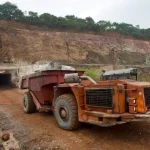Glencore’s Mopani Copper Mines, as a measure to retain sustainability will scale down on production. This is according to the hostile conditions created by the prevailing COVID-19 pandemic which has resulted in dwindling international metal prices and a concoction of other operational challenges.
According to media reports, Mopani had, on 9th of April invoked a “force majeure”, clause in their contracts allowing its contractual obligations to be ignored because of unavoidable circumstance and placed its Mufulira and Kitwe-based mining units under care and maintenance for three months. This meant that the miner is able to place its 11,000 labour force on forced leave until it redresses concerns.
Government intervention
However, the Minister of Mines and Minerals Development, Hon Richard Musukwa has discouraged intentions by the three miners from ceasing operations in Zambia, arguing the reasons for such actions lack merit. He challenged all companies to reconsider.
Further, and while Mopani Copper Mines, has been approached to withdraw its initial plans to close down operations, it has since recalled all the 11,000 workers while engaging the relevant stakeholders on some of the effects on its operations. Unfortunately, there are indications that it could revert to care and maintenance amid gripping concerns.
The Minister argues the 90 days’ notice given by Mopani Copper Mines was meant to put its mines under care and maintenance as opposed to stop operations altogether. He further added that they should instead ensure that the mining firm goes well into survival mode by reducing operating costs.















